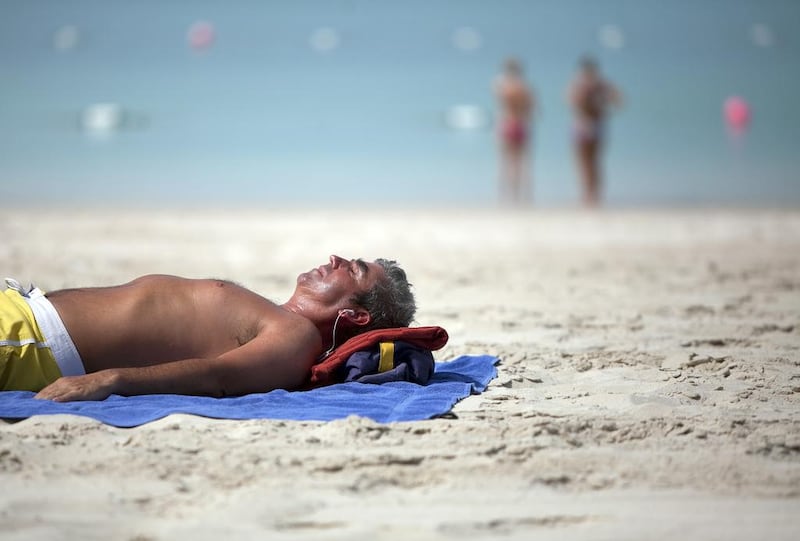ABU DHABI // A weekend at the beach may not be the answer to vitamin D deficiency, doctors say, recommending regular short exposures instead.
Overexposure to sunlight does not increase vitamin D levels. That can, however, cause sunburn, dehydration, heat stroke and an elevated risk of skin cancer.
Myths about sunbathing and the use of vitamin supplements to compensate for vitamin D deficiency may not be helpful.
“Exposure to the sun for long periods is a waste of time. This can lead to photoageing [premature aging of the skin] and the risk of skin cancer. For a person’s body to produce vitamin D, exposing your hands and arms for two to three minutes twice or thrice a week is fine,” said Dr Lakshmi Chembolli, a dermatologist at Medeor Medical Centre.
There are certain times of the day when people should expose themselves to the sun to enable their body to produce vitamin D.
“The UVB [short-wave ultraviolet rays], which is maximum in the midday sun, is required for vitamin D production,” said Dr Chembolli.
“The UVA [long-wave ultraviolet rays] is present all through the day but is not so important for vitamin D production.
“At the same time, UVB also causes pigmentation, skin problems and skin cancers.”
The fairer in complexion a person is, the less exposure to the sun they need.
Dark-skinned people, however, may need to expose themselves to the Sun for a longer period of time to offset their lack of vitamin D, as melanin in the skin reduces the body’s generation of vitamin D from sunlight.
Dr Chembolli said people who jog in the early mornings might need more exposure to the sun.
Dr Manohar Reddy, an internal medicine specialist at NMC Specialty Hospital, said: “In winter it’s okay if you’re exposed to the Sun between 10am to 2pm. In summer, try to avoid the peak heat. Expose yourself to the sun between 9am and 10.30am and between 2pm and 3pm.”
These are the ideal times for the body to generate the required amount of Vitamin D.
Dr Reddy said people should expose themselves to the Sun two or three times a week for about 10 to 15 minutes each.
He also advised people against using sunscreen, which prevents the skin from producing vitamin D.
Dr Reddy said people could boost their vitamin D levels through meals. He recommended taking dairy products, which will provide people with about 25 per cent of the daily vitamin D needs.
UAE national Ayesha Abbas was diagnosed with having a lack of vitamin D six years ago.
She was advised to eat vegetables and was given pills to take daily.
“None of it worked for me, as they were upsetting my stomach,” she said. “The doctor decided I should have monthly injections, which helped for the first few days only.
“I decided not to take any medicine or vitamins and instead focused on eating raw fruits and vegetables.”
Dr Shobha Shetty, an internal medicine specialist at Medeor Medical Centre, said vegetarians and vegans were at a higher risk of lacking vitamin D because they avoid dairy products.
arizvi2@thenational.ae






